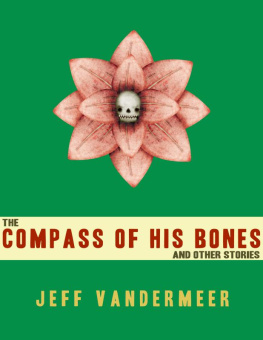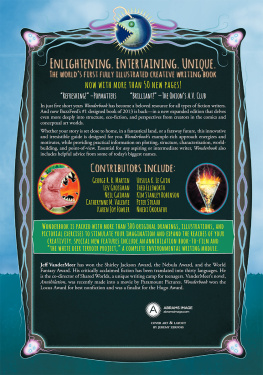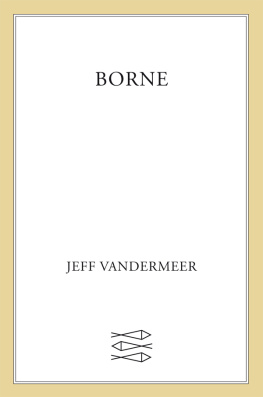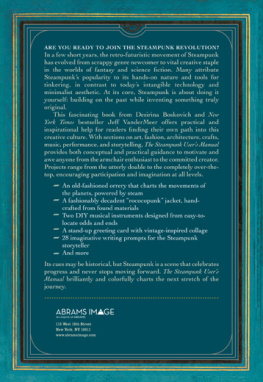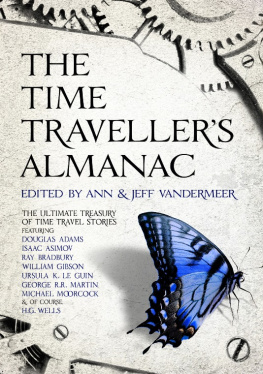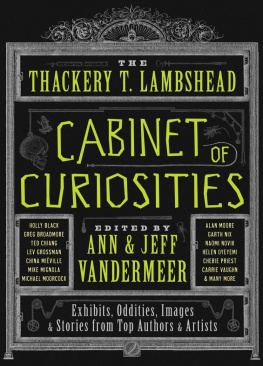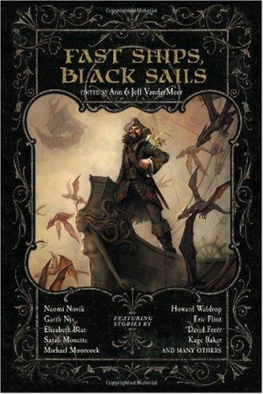Jeff VanderMeer - The Compass of His Bones (and other stories)
Here you can read online Jeff VanderMeer - The Compass of His Bones (and other stories) full text of the book (entire story) in english for free. Download pdf and epub, get meaning, cover and reviews about this ebook. year: 2011, genre: Detective and thriller. Description of the work, (preface) as well as reviews are available. Best literature library LitArk.com created for fans of good reading and offers a wide selection of genres:
Romance novel
Science fiction
Adventure
Detective
Science
History
Home and family
Prose
Art
Politics
Computer
Non-fiction
Religion
Business
Children
Humor
Choose a favorite category and find really read worthwhile books. Enjoy immersion in the world of imagination, feel the emotions of the characters or learn something new for yourself, make an fascinating discovery.
- Book:The Compass of His Bones (and other stories)
- Author:
- Genre:
- Year:2011
- Rating:5 / 5
- Favourites:Add to favourites
- Your mark:
- 100
- 1
- 2
- 3
- 4
- 5
The Compass of His Bones (and other stories): summary, description and annotation
We offer to read an annotation, description, summary or preface (depends on what the author of the book "The Compass of His Bones (and other stories)" wrote himself). If you haven't found the necessary information about the book — write in the comments, we will try to find it.
The Compass of His Bones (and other stories) — read online for free the complete book (whole text) full work
Below is the text of the book, divided by pages. System saving the place of the last page read, allows you to conveniently read the book "The Compass of His Bones (and other stories)" online for free, without having to search again every time where you left off. Put a bookmark, and you can go to the page where you finished reading at any time.
Font size:
Interval:
Bookmark:
THE COMPASS OF HIS BONES
AND OTHER STORIES

Jeff VanderMeer

Cheeky Frawg Books
Tallahassee, Florida
This edition copyright 2011, Jeff VanderMeer and Cheeky Frawg Books.
The stories herein previously appeared in the collection Secret Life (2004), with prior publication in individual periodicals.
Falling into the Arms of Death is previously uncollected.
Cover and Cheeky Frawg logo copyright 2011 by Jeremy Zerfoss.
Ebook design by Neil Clarke.
All rights reserved. No portion of this book may be reproduced by any means, mechanical, electronic, or otherwise, without first obtaining the permission of the copyright holder.
Check out the full line of Cheeky Frawg Books at:
www.cheekyfrawg.com
TABLE OF CONTENTS

INTRODUCTION

This ebook contains the novella Ghost Dancing with Manco Tupac and four related short stories: The Emperors Reply, The Compass of His Bones, La Siesta Del Muerte, and Flight Is For Those Who Have Not Yet Crossed Over. Falling into the Arms of Death owes a huge debt to the writer Lucius Shepard. Together, these stories set in Latin America were to have formed the backbone of a never-completed mosaic novel addressing issues of colonialism, storytelling, appropriation, and myth. The authors interest in Latin America derived from trips there as a child, including a visit to Machu Picchu in the 1970s. Subsequently he studied Latin American history as a minor at the University of Florida.
GHOST DANCING WITH MANCO TUPAC

Sir Richard Bambaugh, Inca Ritual (Harper & Row, 1986)
I
At times it seems to the reporter as she scribbles notes in the dim light that this is his last breath, that the lungs will collapse in mid-sentence; the arms hands twiglike but supple will punctuate his stories with a flourish and then convulse, become limp, cold, languid. The eyes, shining from the sunken orbits, will dim to the color of weathered turquoise. The mouth will die a hummingbirds death, slackening in a final flutter of lips. Already a smell, old as parchment and strong as vinegar, has begun to coat the hotel room. Outside, Cuzcos moonlit streets are silent.
She can taste his death on her tongue: a bitterness softened by the sweet-sour of incense burning in a bowl. Her pen falters on the page, then hurries forward ghoulishly, to catch his essence before it vanishes into the air.
But he does not die that evening, despite the heaving of his breaths, the pauses and halts that disrupt the urbanity of his voice and its subtle hints of accent, none of which can quite break the surface of syntax.
Behind him, black machinery sputters and jerks as it feeds his lungs. At times he is lost within the machines that engulf him, their own cough-cough threatening to drown out his words, or snatch them before they can reach the reporters ears, and by extension, her pen.
She thinks it odd that a machine, a collection of cogs and wires and bellows, should keep a mans soul in his body, the two having no natural connection, nor even a common meeting ground. Yet, when she looks up from her page, he appears to have melted into the machine, no longer a figure draped in sheets, lying placid on a wooden bed.
Then, too, she finds it odd she should be here, having closer kinship to the machinery than the man. At least she can understand the machinery. Peru stonewalls her. It has nothing to do with who she is or what she desires from life. The hotel, for example, carved into the mountainside, and the hotel room with its small window that winks from the wall opposite her chair. The window, during daylight hours, shows a cross-section of mosses and lichens, the loamy soil alive with beetles. Now it is just another shadow, rectangular amid deeper shadows.
The window reminds her of the grave and, staring again at Manco Tupac, last true descendent of the Inca Emperors, she realizes just how small, how birdlike, he is. She had expected a giant, with the sinewy, leathery health of a man who claims to have survived one hundred forty winters in a country that already has her gasping for breath, ears popping. The man lying on the bed looks as though a breeze could strip the flesh from his ribs.
Her expectations have often led her astray; her vision of New York City before she moved there from Florida was of a citadel of shining chrome and steel evenings at the Met, operas at the Lincoln Center, walks in Central Park. Cultural Eden. It was an image that, as her editor at Vistas: Arts and Culture Monthly often says, Got turned on its ass.
When her thoughts stray, as now, to home, or the hypnotic movement of his hands lulls her toward sleep, his words, muscular and tight, bring her back to her notes, to the physical sensation of the pen in her hand, to the nerves in her wrist that tense, untense, tense again.
Already she has been writing for an hour, her tape recorder broken and discarded an isthmus away in Mexico, her wrist ready to break on her now, with no money to replace that, either. She feels a spark of resentment toward the old man in front of her and then rebukes herself. She asked for it. It was the type of assignment her rival freelancers regularly had orgasms over as they drummed up articles from their pathetic little stomping grounds in Manhattan and Brooklyn: interviewing the last of a breed, with all the echoes of faded glory, lost triumphs, a hitherto overlooked pocket of nostalgia that readers and award judges alike could fawn over. Dramatic headlines dance through her head: BRUTAL IRONY: LAST DESCENDENT OF THE INCAS DYING OF ASTHMA; THE SECRET HISTORY OF THE 20TH CENTURY, AS REVEALED BY THE LAST OF THE INCAS. She does not know much more yet. She knows that the old man requested the interview and that he holds an honorary degree from the National University of Lima at Cuzco. Beyond this, nothing. A void as black as the window carved into the mountainside.
Do you think you have transcribed my words accurately thus far? It must be difficult.
His voice startles the reporter, because now it is directed at her. She squints at the page. Her eyes blur. The words become hieroglyphics. What did it mean, really, as a whole? Where is the article she dreamed up while still in New York? The perfect story and yet, almost indefinably, she can sense it going sour, going south.
Yes, I think so, she says, smiling, looking up at him. Even her feet and ankles ache, a healthy, well-used ache, as if she just swam ten laps at her local gym.
Good, he says, and spins out the dry reed of his voice until it is impossibly thin, impossibly tight, tighter than the quipo knots his ancestors wove into compact messages: scrolls of knots sent across the Empire by fleet-footed men with muscles like knots beneath their skin.
She has only her pen.
II
In 1879, when I met the man who called himself Pizarro, though Pizarro had been dead for over 300 years, I knew the Inca knots better than the Espaol of the usurper. I had not yet left my village for renown on the Brazilian coast, nor infamy in the United States, where I would spend many years being hunted by Pancho Villa over one misunderstanding and two exaggerations. I had yet to become known by the moniker of Jimmy Firewalker, and still relied upon my given name, Manco Tupac, which I have returned to in these later years.
Next pageFont size:
Interval:
Bookmark:
Similar books «The Compass of His Bones (and other stories)»
Look at similar books to The Compass of His Bones (and other stories). We have selected literature similar in name and meaning in the hope of providing readers with more options to find new, interesting, not yet read works.
Discussion, reviews of the book The Compass of His Bones (and other stories) and just readers' own opinions. Leave your comments, write what you think about the work, its meaning or the main characters. Specify what exactly you liked and what you didn't like, and why you think so.

